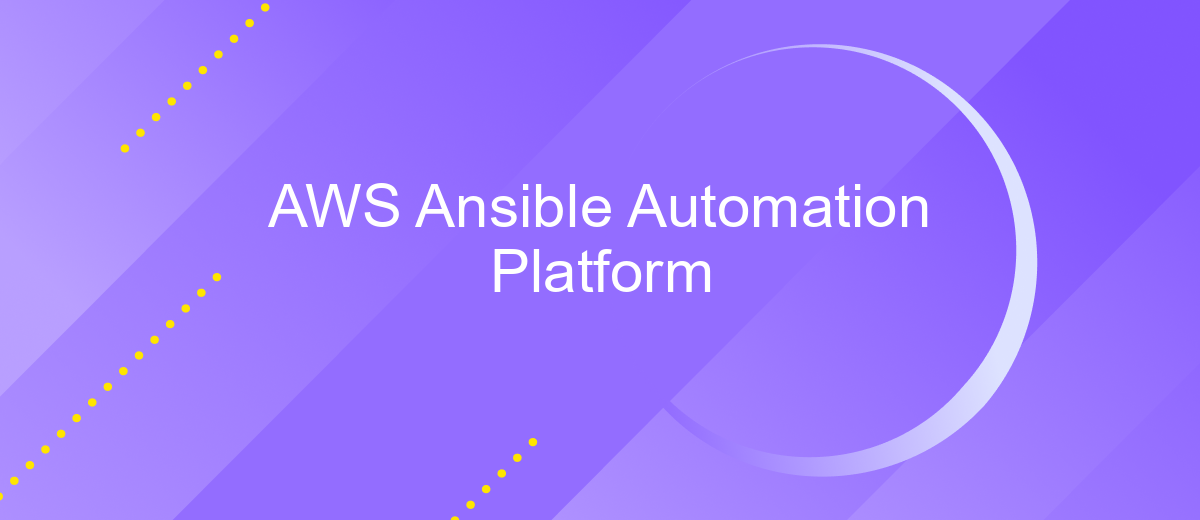AWS Ansible Automation Platform
The AWS Ansible Automation Platform is a powerful tool that streamlines cloud infrastructure management and deployment. By leveraging Ansible's open-source automation capabilities, users can efficiently manage AWS resources, automate complex workflows, and ensure consistency across environments. This platform empowers IT teams to reduce manual tasks, minimize errors, and accelerate cloud operations, making it an essential component for organizations seeking to optimize their AWS infrastructure.
Introduction
The AWS Ansible Automation Platform offers a robust solution for managing cloud infrastructure with ease and efficiency. By integrating Ansible's powerful automation capabilities with AWS's scalable cloud environment, organizations can streamline their operations and enhance productivity. This platform empowers DevOps teams to automate complex workflows, reduce manual intervention, and ensure consistent deployments across multiple environments.
- Seamless integration with AWS services for enhanced cloud management.
- Scalable automation capabilities to handle growing infrastructure needs.
- Comprehensive support for various AWS resources and services.
- Improved operational efficiency through reduced manual tasks.
- Enhanced security and compliance with automated policies and procedures.
By leveraging the AWS Ansible Automation Platform, businesses can accelerate their cloud adoption journey while maintaining control and visibility over their resources. This platform not only simplifies the management of AWS environments but also enables organizations to adapt quickly to changing business requirements. With its user-friendly interface and extensive documentation, AWS Ansible Automation Platform is an indispensable tool for modern enterprises aiming to optimize their cloud operations.
Getting Started

To begin with AWS Ansible Automation Platform, ensure you have an AWS account and necessary permissions to create resources. Start by setting up a control node, which can be any machine with Ansible installed. This node will manage your AWS resources through playbooks. Install Ansible on your local machine or an EC2 instance by following the official Ansible installation guide. Once Ansible is ready, configure your AWS credentials using the AWS CLI or environment variables to allow Ansible to interact with your AWS account seamlessly.
Next, create an inventory file to define the AWS resources you wish to automate. This file can include EC2 instances, RDS databases, and more. Write Ansible playbooks to automate tasks such as provisioning, configuration, and deployment. If you need to integrate additional services, consider using ApiX-Drive to streamline data integration across different platforms. ApiX-Drive offers an easy way to connect various services, enhancing your automation capabilities. Test your playbooks in a safe environment before applying them to production to ensure they work as expected.
Use Cases

The AWS Ansible Automation Platform offers versatile solutions for managing cloud infrastructure efficiently. By leveraging its capabilities, organizations can streamline operations and reduce manual intervention. This platform is particularly beneficial for businesses seeking to enhance their cloud management processes with automation, ensuring consistency and reliability across their environments.
- Infrastructure Provisioning: Automate the deployment of AWS resources, including EC2 instances, S3 buckets, and VPCs, ensuring rapid and consistent infrastructure setup.
- Configuration Management: Maintain system configurations across multiple AWS environments, allowing for seamless updates and compliance with organizational policies.
- Application Deployment: Simplify the deployment process of applications on AWS, reducing the time from development to production and minimizing human errors.
- Disaster Recovery: Implement automated backup and recovery strategies, ensuring data protection and business continuity in the event of failures.
- Security Compliance: Automate security audits and compliance checks, ensuring that AWS environments adhere to industry standards and best practices.
By implementing the AWS Ansible Automation Platform, organizations can achieve enhanced operational efficiency and scalability. This platform not only simplifies complex cloud tasks but also empowers teams to focus on strategic initiatives, driving innovation and growth. Its automation capabilities are essential for modern enterprises aiming to optimize their AWS cloud operations.
Technical Deep Dive

The AWS Ansible Automation Platform provides a robust framework for managing cloud infrastructure through automation. By leveraging Ansible's declarative language, users can define configurations and deploy resources efficiently. This platform seamlessly integrates with AWS services, enabling users to automate tasks such as provisioning, configuration management, and application deployment.
At its core, the platform utilizes Ansible Playbooks, which are YAML files containing tasks to be executed on managed nodes. These playbooks allow for idempotent operations, ensuring that repeated executions yield consistent results. AWS Ansible Automation Platform also supports dynamic inventory, which automatically updates the list of AWS resources, ensuring that infrastructure changes are reflected in real-time.
- Seamless integration with AWS services
- Idempotent playbook execution
- Dynamic inventory management
- Scalability for large environments
The platform's scalability is crucial for managing large-scale environments, allowing users to automate thousands of instances with minimal overhead. With its extensive module library, users can extend functionality to meet specific needs. Overall, AWS Ansible Automation Platform empowers organizations to streamline operations, reduce manual intervention, and enhance infrastructure reliability.


Conclusion
The AWS Ansible Automation Platform provides a robust solution for managing and automating cloud infrastructure. By leveraging Ansible's powerful automation capabilities, organizations can streamline their operations, reduce human error, and ensure consistent deployments across their AWS environments. The platform's flexibility and scalability make it an ideal choice for businesses looking to optimize their cloud operations and improve efficiency.
Integrating services like ApiX-Drive further enhances the capabilities of AWS Ansible Automation Platform by facilitating seamless connectivity between various applications and services. This integration allows for automated workflows that can save time and resources, enabling teams to focus on strategic initiatives rather than manual tasks. As cloud environments continue to evolve, the combination of AWS Ansible Automation Platform and ApiX-Drive positions organizations to stay ahead of the curve, ensuring they can adapt quickly to changing demands and maintain a competitive edge in the digital landscape.
FAQ
What is AWS Ansible Automation Platform, and how does it work?
How can I start using AWS Ansible Automation Platform?
What are the benefits of using Ansible with AWS?
Can I integrate AWS Ansible Automation Platform with other tools and services?
What are some best practices for using AWS Ansible Automation Platform?
Routine tasks take a lot of time from employees? Do they burn out, do not have enough working day for the main duties and important things? Do you understand that the only way out of this situation in modern realities is automation? Try Apix-Drive for free and make sure that the online connector in 5 minutes of setting up integration will remove a significant part of the routine from your life and free up time for you and your employees.

